Quintana Roo PRthree
Last week I gave folks some very good news! Or very insulting news! Depending on how folks took it.
I wrote a preamble to a class of bikes I intended to review, and I called these bikes Entry Level Plus, the “plus" part differentiating between the true floor of the market, pricewise, versus the price floor of the category of bike that could win an Ironman race.
How dare you call $2,500 entry level! Oh, the horror! The price floor of a decent, rideable tri bike is between $1,800 and $2,000. But there’s a performance ceiling on these bikes. They just probably aren’t bikes aboard which you can easily win a race.
Once you get to $2,500, now you have bikes with frames, components, saddles, aerobars that are good enough to stand up to the training, and the miles, and deliver comfort, aerodynamics, sufficient stiffness in the entire system to prevail against speed wobble and bad handling. They are upgradeable. They are very close cousins to the bikes costing double or triple as much. This is the entry point of bikes that can win races.
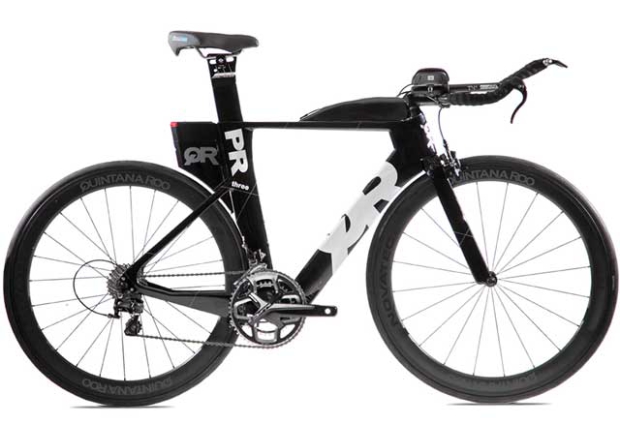
It was with great difficulty that I, as a bike maker, priced my entry level tri bikes at $1,500 in the early 1990s. Those bikes would cost near double that in today’s dollars, and those bikes didn’t come close to offering the value the bikes offer today – like the bike I’m going to write about below.
And this is apropos, because those bikes I made in the early 1990s had the same headbadge as the bike I’m writing about today.
Quintana Roo PRthree
I’m going to try a little experiment. I’m going to go through this bike part-by-part and see if there are any fails. Then I’ll go through the frame. In the end, we’ll have a list of what this bike lacks.
There are two ways you can buy this bike: Standard wheels, Shimano 105 parts, $2,599 complete. Or, $3,699 with Novatec R5 wheels.
Wheels: The Shimano WH-RS010 wheels that come on this bike aren’t the cheapest Shimano makes, by a longshot, but they’re not movie star wheels either. They’re perfectly acceptable, workmanlike, they’re going to stay in true and the only thing they lack is whatever aero benefit you get from a different set of wheels. The upgrade is the Novatec R5 wheels and the nice thing about the Novatecs, from what I hear, is that they’re bombproof. QR’s Brad Devaney has them on his gravel bike. That said, I kind of like this bike at the $2,599 level, because if you wait you’ll find a nice rear disc + a 40mm or 60mm on offer for around $1000 or $1200 for the pair, from somebody (e.g., HED Jet disc and 60?). Then you have 2 wheelsets, one of which is your bailout wheel to keep you riding if the first goes down.
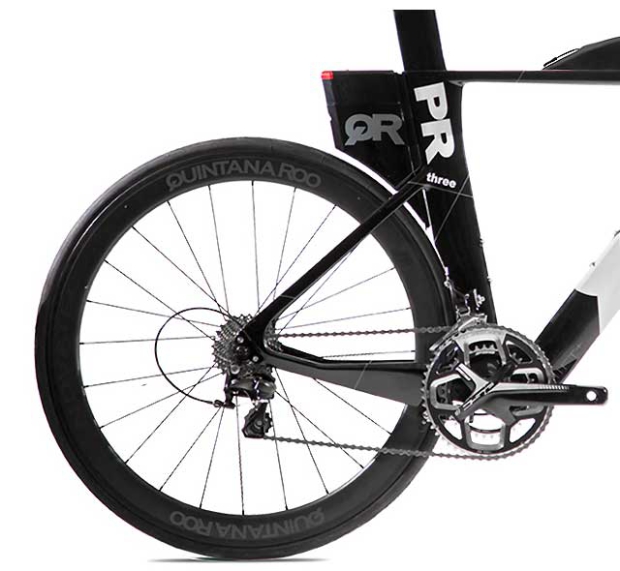
Tires: They are “Continental” which could mean anything made by that German company and it doesn’t really matter. It’s like the OE tire on your new car – whatever it is, you’ll have to change it pretty soon anyway.
Groupkit: It’s Shimano 105 for chain, cassette, front and rear derailleurs and brake calipers. What is the difference between this and Ultegra, or Dura Ace for that matter? Well, $$. Mostly. Beyond that, it’s longevity (but even then, the 105 will last you a long time). The 105 parts won’t rust in the rain, they’ll shift and stop just as well, there is no big difference in performance. In truth, most of the performance difference between 105 and its more expensive cousins occurs in the versions. And this did happen! Dura Ace and Ultregra upgraded to 9000 and 8000 respectively (and the further Dura Ace upgrade to 9100, as a reader pointed out), while this 105 groupkit still retains the 5800 series designation. What new tech is missing? The crank got an upgrade between Ultegra 6800 and 8000, but the PRthree doesn’t spec a Shimano crank. The Ultegra 8000-series RD can accept up to a 34t rear cog. You planning on putting a cog that big on your tri bike? Road controls changed. Doesn’t matter on this bike (it's a tri bike; there are no road controls). There is a slight change in the action of the FD. There is one notable difference that could affect you: The new Ultegra 8000 brake calipers can handle a wider tire than the old 6800, and likewise this 105 5800 brake caliper. Still, I think that’s more an issue for rim-brake road bikes that “want” to be gravel bikes.
Crank and BB: In order to keep this bike affordable the crankset is a FSA Gossamer Pro. More to consider, really, than the crank are the chain rings. If the rings suck, the chain could too. Suck, that is. (Chain suck is a thing.) If you’d have asked me 8 years ago I’d have written this differently. I’d have said buy the bike, immediately pull the cranks and throw them away, get yourself something decent. But FSA has come a long way with the Gossamer Pro, and has pretty well plugged any holes. Full Speed Ahead has a lot of these babies on the road. Because the frame is a PF30, this bike uses a PF30 bottom bracket that mates with the Gossamer Pro BB386 crank. Too much information? Not to worry. Just buy it and ride it.
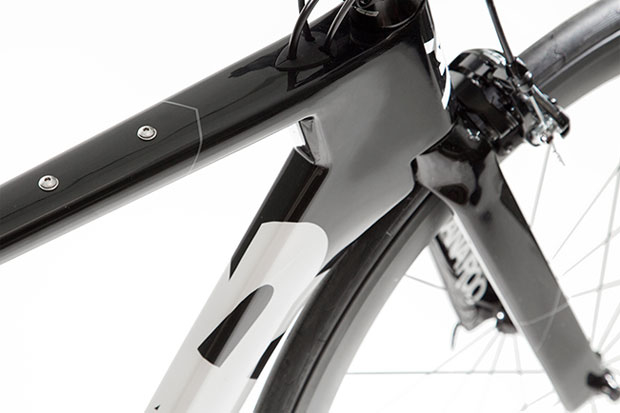
Gearing: Here is one thing QR has done well for a long time. They actually have thought through gearing, and the bike comes with 52×36 chain rings and an 11sp 11-28 freewheel. This gives you plenty of gear on either side. I hate it when a bike company gives me OE gears that I must immediately change just to ride the thing.
Aerobars: See my comments in the preamble to this series. I’d like a Profile Design J4 or J5 bracket. What I get on this bike is a J2, which I don’t like as well. This means I’m stuck with an aluminum extension. But that’s okay. At least it’s the right extension shape. What would I do if this were my bike? I’d immediately pull the cables out, take the shifters off, measure just over 2cm of straight section after the bend, and whack off the ends of the extensions so the shifters don’t stick up so high. Then I’d route everything back. (The key thing here is to leave enough of the straight section to accept all of the shifter’s wedge mechanism.) Then I’d double wrap the entire upturn section with handlebar tape (or maybe put some grips on there) to fatten up the extensions. Now I’m ready! What QR did do was spec PD’s F35 armrest, which is comfy as all get out and it adjusts wide enough for anybody.
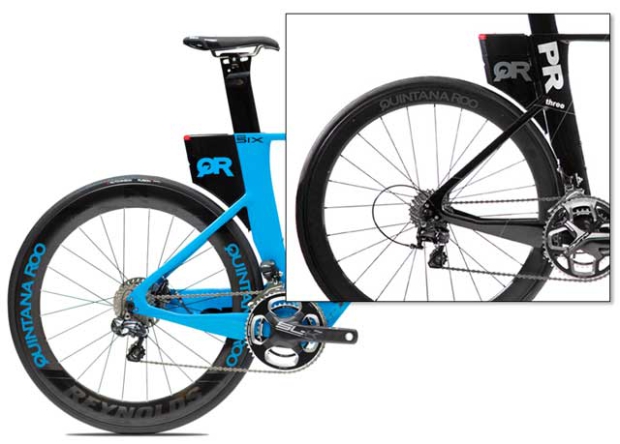
Saddle: I visited 40 retail stores over the last 2 years, and fit about 250 of you in those stores at Slowtwitch Road Shows. I brought a whole bunch of saddles to every Road Show. The most frequently chosen saddle at these Road Shows, when I tested all the best saddles underneath you all, was the ISM PR2.0. The saddle spec’d on this bike is the ISM PR2.0.
Okay, now let’s talk about the frame, fit, handling, adjustability, aerodynamics, and storage.
Frame: What is different about this frame and its pricier cousins, the PRfive and the PRsix? Quintana Roo has a proprietary tech it hangs its hat on called Shift Technology. The idea is to shift the wind away from the drive side to the other side of the frame. The assumption here is that the other side is cleaner. Is that true? I have my questions about that. Nevertheless, I don’t much care, because the bike itself, when wind tunnel tested, fares admirably compared to those in its competitive set. But the PRthree is not the same as the other two PR-series bikes. Look at that beefy off-side chain stay in the (blue) PRsix frame above. You don’t see that big stay in the PRthree, do you? How much difference does that make?
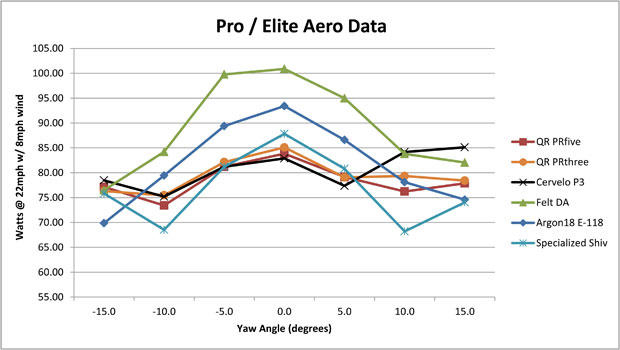
Above is a chart showing aero testing that incluedes the PRfive and PRthree, and you can see that the difference is pretty minor. Because the PRFive shares a fork with the PRthree, that fat chain stay is the only design feature that differs between these two bikes in the test above.
As an aside, the blue bike above is not the standard PRsix but the disc brake version, and while that chain stay wasn’t designed with this in mind, I do find it a nice happenstance that that big ol’ stay is there, because to me it opens up the possibility of some fairing of the rear caliper and rotor. But that’s a story for another day.
Fork: There is another difference between the PR series bikes and that is the fork. As you can see, the PRsix has an integrated front end that begins with a beefy fork that wraps over the front of the frame’s head tube. No other PR series bike has this. How much difference does it make? I don’t know. I do know that forks can make a big aero difference. One thing about all the PR series bikes is that the surface area of the fork is behind the rake line, and any surface area that’s attached the fork or steer column that sits behind the rake line offsets the steering torque the rider experiences in a sidewind.
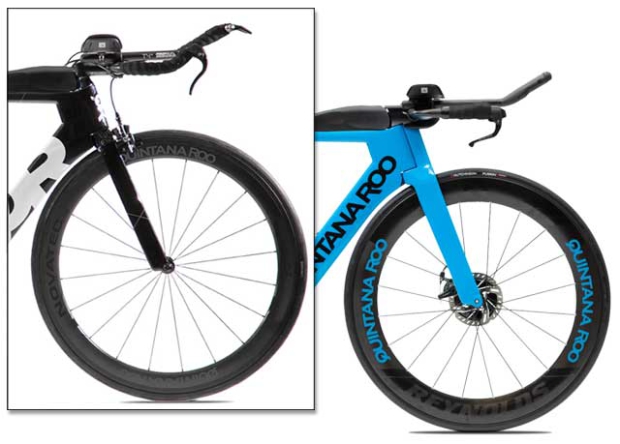
Adjustability: I think tri bike makers ought to adhere to primum non nocere. It’s the first rule of bioethics: First, do no harm. When a tri bike fails to fulfill the basic functions of the bike – won’t stop, isn’t straight, doesn’t handle, can’t adjust, doesn’t fit – then really, what’s the point? Lord knows, many tri bikes have failed this. QR made a decision some years back (with the PR series, actually) to adhere to this. To be clear, it hasn’t always done so, even with the PR series. The original PRsix had a stem I felt pushed the front of the bike a little high and long, and they subsequently fixed this with a sleeker, better fitting (in my opinion) stem, but the PRthree has no such issue because it’s a mortal bike (put any stem on it you want).
The spec’d stems are –17°, parallel to the horizon, which I like, because QR thinks (and I agree) that any height you need you oughta first get by aerobar pedestals, and it spec’d an aerobar that is well conceived and designed to give you the height you need via pad pedestals. Because of the new Profile Design Subsonic bar to which I alluded in my series preamble, you now have, with this bike, and either the OE bar spec’d here or the new Subsonic bar arriving Stateside in a couple of months, pretty much no chance of not fitting on this bike. And as a final statement on this, why in the world don’t tri bike makers use seat posts like this, or the Ritchie aero seat post hardware (either one is fine), that slide back and forth almost to infinity?
Sizing: Here’s where you’re going to mess up. You’re 6’1” and you're pretty sure you need a size 58.5cm in this bike because it’s what you ride in your road bike. Nope! Okay, you realize your mistake. You need a 56cm, because that’s what you’d ride in a Felt or Cervelo in the geometry you need, which is a frame stack of 540mm and a Reach of 425mm (also the same as a Trek Speed Concept in size L). Nope! While QR does make a bike with a stack of 540mm and a Reach of 425mm, that bike is a 54cm. Why? Because QR thinks numbers ought to mean things and it decided that the frame stack and the frame size ought to be congruent. A stack of 540mm is also a stack of 54cm, and therefore it’s a size 54. Get it? Okay, I told you this, now that you know this don’t make a mistake and get talked into a bigger frame size than you ought to have!
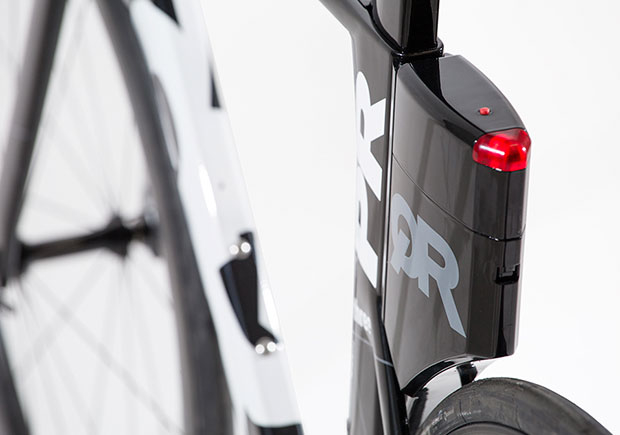
Geometry and Handling: One thing QR is known for, throughout it’s history – ahem – are bikes that fit, that handle, with good weight displacement. Same thing here. The only thing I wish were not the case is that the smallest size is not a 650c-wheel bike.
Storage: This bike keeps adding storage every year. By 2020, at this pace, you’ll have room for your sleeping bag. First was the Q Box, which is that great idea Trek started, now Felt has it, but QR was (I think) the first to creatively swipe Trek’s creative idea. And, QR put a blinking red flasher on its version. Then it put the top tube storage thingy on there, reminiscent of Scott’s Plasma Premium, Diamondback’s Andean (the king of storage!), and others. There is no front hydration on this bike, but it’s Profile Design and XLAB to the rescue.
Wrenchable?: It’s not enough simply to have range of adjustment. One wants such adjustment to be fairly simple. The Speed Concept has a ton of adjustability, but it’s not exactly a straightforward bike to work on. It’s a technological wonder – don’t get me wrong – but if you want to (say) adjust the brakes, or raise the aerobar pads, or make the cockpit longer or shorter, best block out some time. One of QR’s imperatives for this series of bikes was: 2 Allen key sizes. Now, that’s not exactly true, because Shimano requires more than 2 for its parts. But the rest of the bike is very easily adjustable, and quite widely adjustable, fixable, easy to travel with. When I used to travel the pro circuit, a generation ago, it was uncanny how the pros could find out where I was staying. Just about every race, the night before the race, I’d hear a knock on my hotel room door, somebody looking for help for a bike that wouldn't adjust. With the PR series, you don’t have to go knock on anybody’s door. This bike’s a snap to adjust.
How to Buy?: Quintana Roo is probably farther ahead of any other bike company, right now, in “omnichannel”. Imagine a purchase channel and this bike is probably sold that way (thru a bike shop, a bike fitter, or direct to the consumer). This changes a bit based on the model, and the PRthree is more likely to be available through a local bike shop than the higher end models. Quintana Roo has a chat option on its website, lower right hand corner of your browser.
So! What’s Wrong With This Bike?: Pardon the vintage movie reference, but i’m reminded of Charade (1963), where Audrey Hepburn asks Cary Grant, “Do you know what's wrong with you?" "No, what?" Grant replies. "Nothing!” And there you have it. This bike sells for $2,599 and pretty much kills it for the price. Add some HEDs or FLOs, and you’re ready to storm the castle.


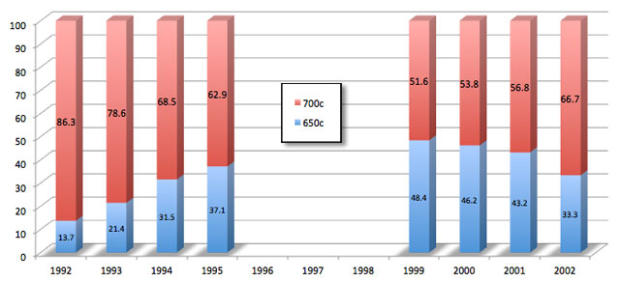
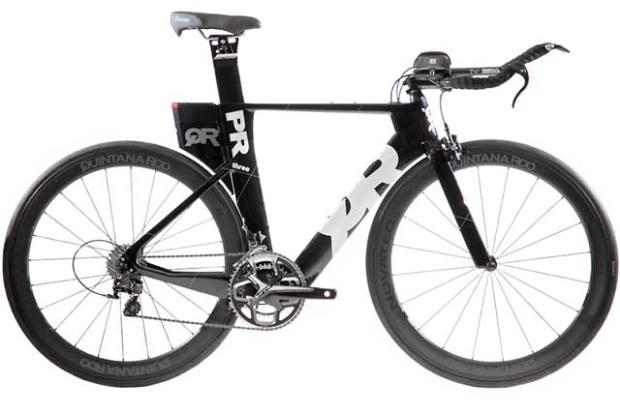
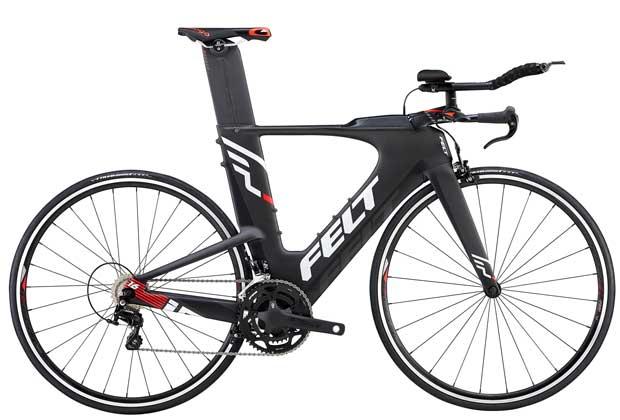
Start the discussion at slowtwitch.northend.network